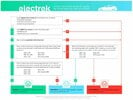(f)(10) Limitation based on modified adjusted gross income.
(A) In general. No credit shall be allowed under subsection (a) for any taxable year if --
(i) the lesser of --
(I) the modified adjusted gross income of the taxpayer for such taxable year, or
(II) the modified adjusted gross income of the taxpayer for the preceding taxable year, exceeds
(ii) the threshold amount.
(B) Threshold amount. For purposes of subparagraph (A)(ii), the threshold amount shall be --
(i) in the case of a joint return or a surviving spouse (as defined in section 2(a)), $300,000,
(ii) in the case of a head of household (as defined in section 2(b)), $225,000, and
(iii) in the case of a taxpayer not described in clause (i) or (ii), $150,000.
(C) Modified adjusted gross income. For purposes of this paragraph, the term "modified adjusted gross income" means adjusted gross income increased by any amount excluded from gross income under section 911, 931, or 933.



